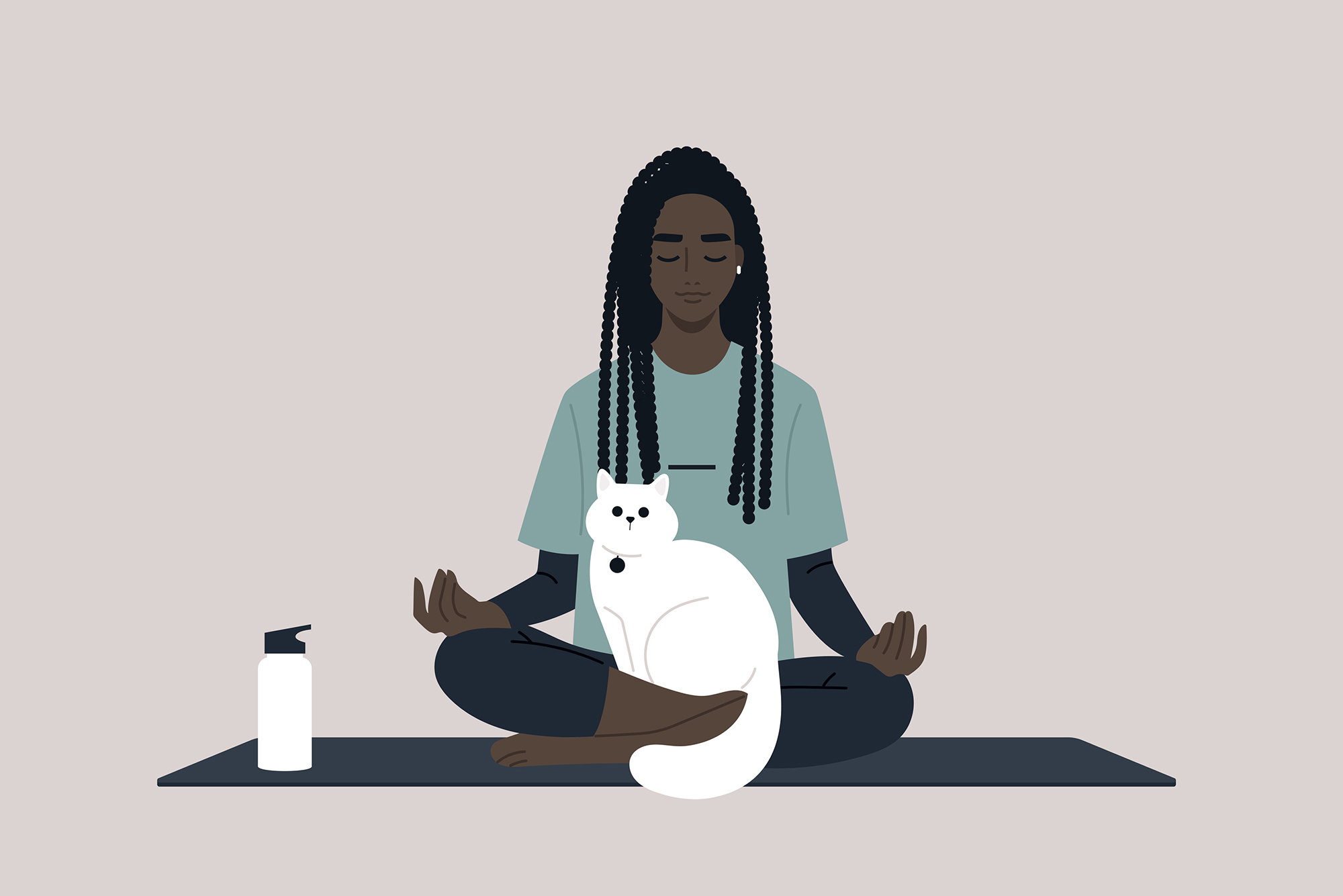Wellness Fair for BU’s BIPOC Community at Thurman Center Wednesday
Student-run event includes therapy consultations, free products, and visits from local community mental health organizations

Several BU student associations have joined forces to organize the first-ever BIPOC Wellness Fair. Illustration by nadia_bormotova/iStock
Wellness Fair for BU’s BIPOC Community at Thurman Center Wednesday
Student-run event includes therapy consultations, free products, and visits from local community mental health organizations
While the COVID-19 pandemic has had a profound impact on mental health, current research indicates that it is especially true for BIPOC (Black, indigenous, people of color) individuals, who already face significant barriers when needing mental health care.
Data show that BIPOC groups are less likely to have access to mental health services, more likely to receive poor care, and more likely to stop attending treatment. What’s more, barriers like systemic racism, cultural stigma around mental illness, mistrust of mental health care providers, and cultural insensitivity from mental health care providers make matters worse.
Spurred by these findings, the student associations Queer Activist Collective (or Q, as members call it), the BIPOC Mental Health Collective, and the BU Student Government Mental Health Committee have joined forces to organize the first-ever BIPOC Wellness Fair, which will be held tomorrow, Wednesday, February 16, in the Howard Thurman Center for Common Ground.
The fair will feature representatives from BU and Boston-based community organizations that provide wellness resources to communitities of color and LGBTQ+ folks (find the full list here), consultations with BIPOC therapists, free self-care supplies, as well as free gender-affirming products, including chest binders, tucking underwear, and femme shapewear (see our story on this initiative tomorrow).
“We really tried to represent a wide variety of wellness resources, covering mental health, sexual health, housing and financial support, survivor advocacy,” says Christa Rose (CAS’22), president of Q. “We tried to be as intersectionality-inclusive as possible. A misconception is people thinking the BIPOC community is a monolith and everyone has the same needs… A big goal for all of us was to make sure that this event is very inclusive of all races, ethnicities, genders, sexualities, abilities, etc.”
Among the local organizations participating are Boston GLASS, which provides services such as free STI/HIV testing and safer sex supplies for LGBTQ+ students of color; IMPACT Boston, which teaches self-defense programs and workshops on topics like conflict de-escalation and assertive communication; and Casa Esperanza, a Roxbury nonprofit that assists Latinx community members who are struggling with substance abuse and mental health illnesses.
BU groups and departments at tomorrow’s fair are BU Sexual Assault Response & Prevention Center (SARP), the College of Arts & Sciences Anti-Racist Initiative, and College Mental Health Education Programs, which is run out of BU’s Center for Psychiatric Rehabilitation.
The fair’s organizers started planning the event at the beginning of the semester, called to action after hearing from students about their difficulties finding BIPOC therapists in the area. They weren’t mistaken—less than one fifth of therapists in this country are BIPOC. Psychology major Sanjana Doshi (CAS’24) says the lack of diversity in her chosen field is one of the reasons she wants to pursue it.
“Finding someone who understands the experience minorities have—whether you’re queer, whether you’re a person of color—it’s very hard to find this specialized care,” Doshi says. For this reason, the organizers hope the BIPOC therapy consultations will be especially useful to attendees.
Rose says many students struggle with how to find a therapist and how to navigate insurance, and some students—specifically LGBTQ+ individuals—may be concerned about accessing therapy discreetly, especially if they’re on their parents’ insurance and don’t want them to know about their appointments. Students have said that the waitlist to get an appointment at BU Behavioral Medicine can be very long, she says, “and the staff have been notorious for misgendering and deadnaming students, so folks just do not feel comfortable. So really these sessions are meant to answer those questions and tackle all these things, and ultimately just be more affirming and comfortable sessions with therapists and help students connect with a therapist or learn more about mental health care options.”
The Wellness Fair is just one more way students can erase the stigma around mental health, organizers say, and their goal is that mental health concerns should have the same seriousness as a physical issue. For instance, a student isn’t shy about letting a professor know they need to miss class for a stomachache, and the same should hold true for a panic attack.
Nia Smith (CAS’24), colead of the BIPOC Mental Health Collective, started a mental health advisory board in high school because the topics of mental health and therapy were “just so taboo, especially because I was in a predominantly African American community,” she says. “Nobody wants to talk about mental health problems. But then I came to BU, and I saw that people actually talked about mental health here and going to therapy and students were so open about it.”
The organizers chose the Howard Thurman Center since it is a “safe space for people of color,” Doshi says.
The BIPOC Wellness Fair is Wednesday, February 16, from 10 am to 3 pm at the Howard Thurman Center, 808 Commonwealth Ave. The event is free and open to all BIPOC BU community members. A BU ID, green badge, and mask are required for entry.
The Howard Thurman Center is mobility device–accessible. All-gender bathrooms are on the building’s first floor. Contact Q at queer@bu.edu for questions about accessibility or to request an accommodation.

Comments & Discussion
Boston University moderates comments to facilitate an informed, substantive, civil conversation. Abusive, profane, self-promotional, misleading, incoherent or off-topic comments will be rejected. Moderators are staffed during regular business hours (EST) and can only accept comments written in English. Statistics or facts must include a citation or a link to the citation.